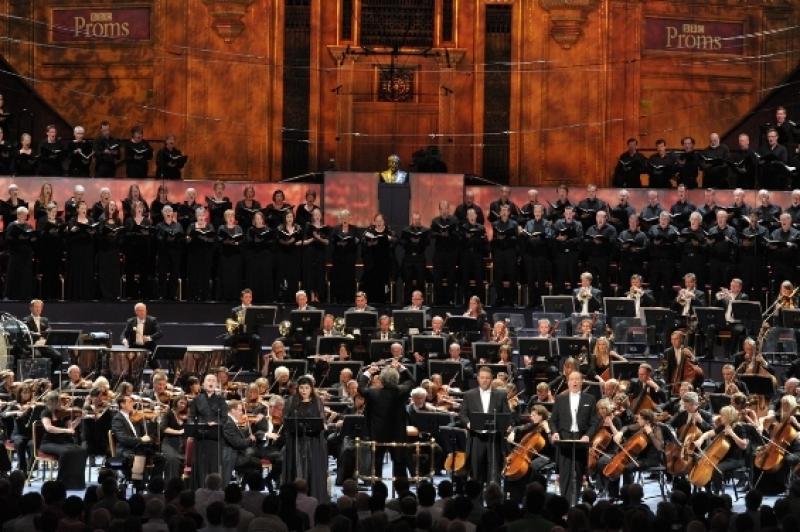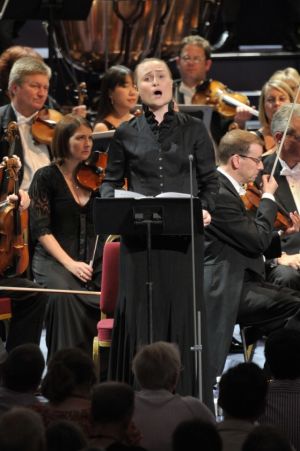BBC Proms: Verdi's Requiem, BBCSO, Bychkov | reviews, news & interviews
BBC Proms: Verdi's Requiem, BBCSO, Bychkov
BBC Proms: Verdi's Requiem, BBCSO, Bychkov
Poplavskaya and choir offered tenderness and terror

You can't say this about many works but Verdi's Requiem really is as snug as a bug in a rug in the Royal Albert Hall. In which other space could the three moon-like bass drums orbiting the back of the orchestra not look ridiculous? Last night's performance seemed to have all the hallmarks of a classic. Great cast. Three of Britain's great amateur choirs. One of the most talented conductors of his generation. All Bychkov needed to do was mix and stir. Right?
Certainly if we went around individually, no fault would be found. The choir (which included the BBC Symphony Chorus, BBC National Chorus Orchestra of Wales and London Philharmonic Choir) paraded their flawlessness first. Their dramatic, early, washed-out sound exploded with unforgettable terror in the Dies irae. And what an unbelievably well-drilled lot they were, tackling the fugal Sanctus as if they were a hundredth of the size. They were characterful, united and yet somehow alert to every nuance of the words. There was fear and grisly excitement in their reporting of the details of the day of judgment, cold sweaty-palmed mania in their evocation of eternal rest.
Marina Poplavskaya (pictured below) was the first of the singers to impress. She apparently had a cold. There was little sign of it. But she did play the role of the praying supplicant with such fervour that I did wonder if there was something niggling at her that was making her inhabit the God-cooing role so conscientiously. Mezzo Mariana Pentcheva opened with a vibrato that oscillated so broadly it sounded like she was yodelling. But she tightened up at the top for the Lux aeterna.
 Ferruccio Furlanetto's roomy bass and Joseph Calleja's seductive tenor were, as ever, both seriously classy. They might have (and, now and again, did) introduce a sense of theatre to this operatic requiem. The orchestra might have followed the choir's lead and played with a touch more colour. But Bychkov appeared less interested in the short-term roller-coastering peaks and troughs than the long-term restless search for spiritual respite.
Ferruccio Furlanetto's roomy bass and Joseph Calleja's seductive tenor were, as ever, both seriously classy. They might have (and, now and again, did) introduce a sense of theatre to this operatic requiem. The orchestra might have followed the choir's lead and played with a touch more colour. But Bychkov appeared less interested in the short-term roller-coastering peaks and troughs than the long-term restless search for spiritual respite.
This focus on structure meant that the final 20 minutes saw the most memorable playing and singing. A frailty hit Poplavskaya's voice in the Libera me that elicited the most tender singing imaginable. While others sang with fluency, Poplavskaya inhabited the heart and soul of a whole other character, a whole other spiritual domain. With Bychkov, heart and soul came with the earth-shattering final choral climax. This was the point the desperation of this atheist's requiem really seized me.
Having said all this, I must confess, somewhat shame-facedly, that I feel I might be falling out of love with this piece; for the first time in my life, I could only see gaucheness in the score. And its theatricality seemed to say little to the tragedy of Saturday. Yet Bychkov rescued it. His sober but ultimately bone-shakingly cathartic take made one realise how much can be gained from viewing Verdi's creation sombrely, seriously and in a single cosmic span.
- Listen again for the next seven days on the BBC iPlayer via the Proms website
- theartsdesk's pick of the Proms
- theartsdesk's BBC Proms 2011 complete listings
Add comment
The future of Arts Journalism
You can stop theartsdesk.com closing!
We urgently need financing to survive. Our fundraising drive has thus far raised £49,000 but we need to reach £100,000 or we will be forced to close. Please contribute here: https://gofund.me/c3f6033d
And if you can forward this information to anyone who might assist, we’d be grateful.

Subscribe to theartsdesk.com
Thank you for continuing to read our work on theartsdesk.com. For unlimited access to every article in its entirety, including our archive of more than 15,000 pieces, we're asking for £5 per month or £40 per year. We feel it's a very good deal, and hope you do too.
To take a subscription now simply click here.
And if you're looking for that extra gift for a friend or family member, why not treat them to a theartsdesk.com gift subscription?
more Classical music
 Kempf, Brno Philharmonic, Davies, Bridgewater Hall, Manchester review - European tradition meets American jazz
Bouncing Czechs enjoy their Gershwin and Brubeck alongside Janáček and Dvořák
Kempf, Brno Philharmonic, Davies, Bridgewater Hall, Manchester review - European tradition meets American jazz
Bouncing Czechs enjoy their Gershwin and Brubeck alongside Janáček and Dvořák
 Solomon, OAE, Butt, QEH review - daft Biblical whitewashing with great choruses
Even a top soprano and mezzo can’t make this Handel paean wholly convincing
Solomon, OAE, Butt, QEH review - daft Biblical whitewashing with great choruses
Even a top soprano and mezzo can’t make this Handel paean wholly convincing
 Two-Piano Gala, Kings Place review - shining constellations
London Piano Festival curators and illustrious friends entertain and enlighten
Two-Piano Gala, Kings Place review - shining constellations
London Piano Festival curators and illustrious friends entertain and enlighten
 Echo Vocal Ensemble, Latto, Union Chapel review - eclectic choral programme garlanded with dance
Beautiful singing at the heart of an imaginative and stylistically varied concert
Echo Vocal Ensemble, Latto, Union Chapel review - eclectic choral programme garlanded with dance
Beautiful singing at the heart of an imaginative and stylistically varied concert
 Scott, Irish Baroque Orchestra, Whelan, RIAM, Dublin review - towards a Mozart masterpiece
Characteristic joy and enlightenment from this team, but a valveless horn brings problems
Scott, Irish Baroque Orchestra, Whelan, RIAM, Dublin review - towards a Mozart masterpiece
Characteristic joy and enlightenment from this team, but a valveless horn brings problems
 Classical CDs: Voice flutes, flugelhorns and froth
Baroque sonatas, English orchestral music and an emotionally-charged vocal recital
Classical CDs: Voice flutes, flugelhorns and froth
Baroque sonatas, English orchestral music and an emotionally-charged vocal recital
 Kanneh-Mason, Britten Sinfonia, Shave, Milton Court - a grin and a big beaming smile
A pair of striking contemporary pieces alongside two old favourites
Kanneh-Mason, Britten Sinfonia, Shave, Milton Court - a grin and a big beaming smile
A pair of striking contemporary pieces alongside two old favourites
 theartsdesk at the New Ross Piano Festival - Finghin Collins’ musical rainbow
From revelatory Bach played with astounding maturity by a 22 year old to four-hand jazz
theartsdesk at the New Ross Piano Festival - Finghin Collins’ musical rainbow
From revelatory Bach played with astounding maturity by a 22 year old to four-hand jazz
 First Person: Manchester Camerata's Head of Artistic Planning Clara Marshall Cawley on questioning the status quo
Five days of free events with all sorts of audiences around Manchester starts tomorrow
First Person: Manchester Camerata's Head of Artistic Planning Clara Marshall Cawley on questioning the status quo
Five days of free events with all sorts of audiences around Manchester starts tomorrow
 Goldscheider, Brother Tree Sound, Kings Place review - music of hope from a young composer
Unusual combination of horn, strings and electronics makes for some intriguing listening
Goldscheider, Brother Tree Sound, Kings Place review - music of hope from a young composer
Unusual combination of horn, strings and electronics makes for some intriguing listening

Comments
...